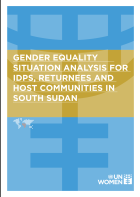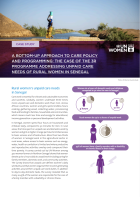1 - 6 of 6 Results
Date:
As gaps remain in efforts to stem the tide of global economic crises, having fiscal policies in place to safeguard spending for women is essential. Gender Responsive Budgeting (GRB) can ensure a gender-equitable allocation of resources and expenditure tracking to promote gender equality. This briefing note provides information on the foundation established to determine entry points for this work, key partnerships, and plans to advance systemic financing for gender equality in the country.
Date:
In Senegal, UN Women's 3R programme has focused on: research to identify unpaid care needs of women in rural areas; integrating unpaid care solutions in local investment plans; adapting and scaling up health insurance solutions through policy dialogue with the National Health Insurance Agency and the private sector; and using these experiences to facilitate evidence-based care policy dialogues. This case study discusses the program's experience and results.
Date:
The transition to a green economy will create many new jobs around the world, including in sub-Saharan Africa. But will women share-in these new jobs, and will the economic transformation help them move into higher-paid, more stable jobs that require more education and skills? The short answer is “yes” – provided countries adopt strong policies and programmes to make it happen. The green economy transition is attracting attention in policy circles but its potential gender...
Date:
This brief presents emerging evidence on the role the private sector can play in promoting gender equality and women’s empowerment in Nigeria by highlighting the key measures companies can take to move beyond traditional corporate social responsibility to combine profits with gender progress. Realizing the growing need for gender equality is also germane to the survival and development of girls and the building of healthy communities, a healthy society, and a healthy nation. The economic...
Date:
UN Women, Findev Canada and the African Fintech Advisory – Lelapa, facilitated in November 2019 a co-creation workshop bringing together investment officers from Development Finance Institutions and female Fund Managers from across Africa, specialized in financing women-led businesses. This report, which presents the results of the workshop, includes perspectives of both constituencies on blockages to make DFI finance flow to women SMEs in the continent, and identifies concrete proposals...
Date:
On 25 September On 25 September2015, the United Nations General Assembly adopted the 2030 Agenda for Sustainable Development as the agreed framework for international development. It is the successor to the Millennium Development Goals (MDGs). However, unlike the MDGs, the 2030 Agenda presents a much wider scope by deliberately and more fully incorporating economic and environmental sustainability, as well as the aspiration of many countries for peaceful and inclusive societies.






